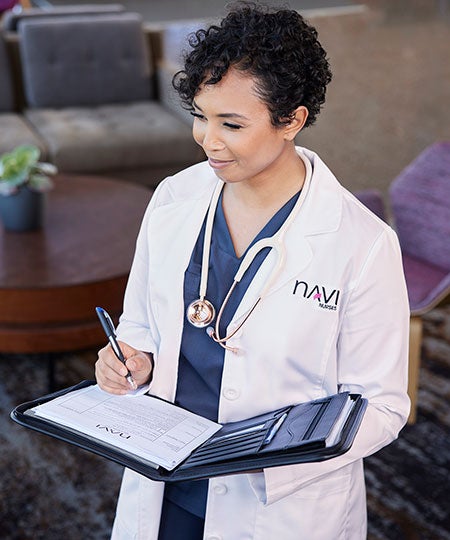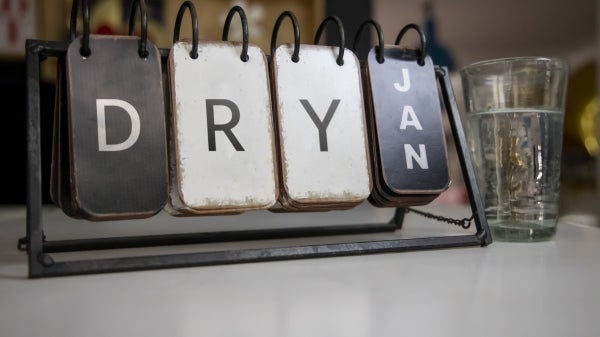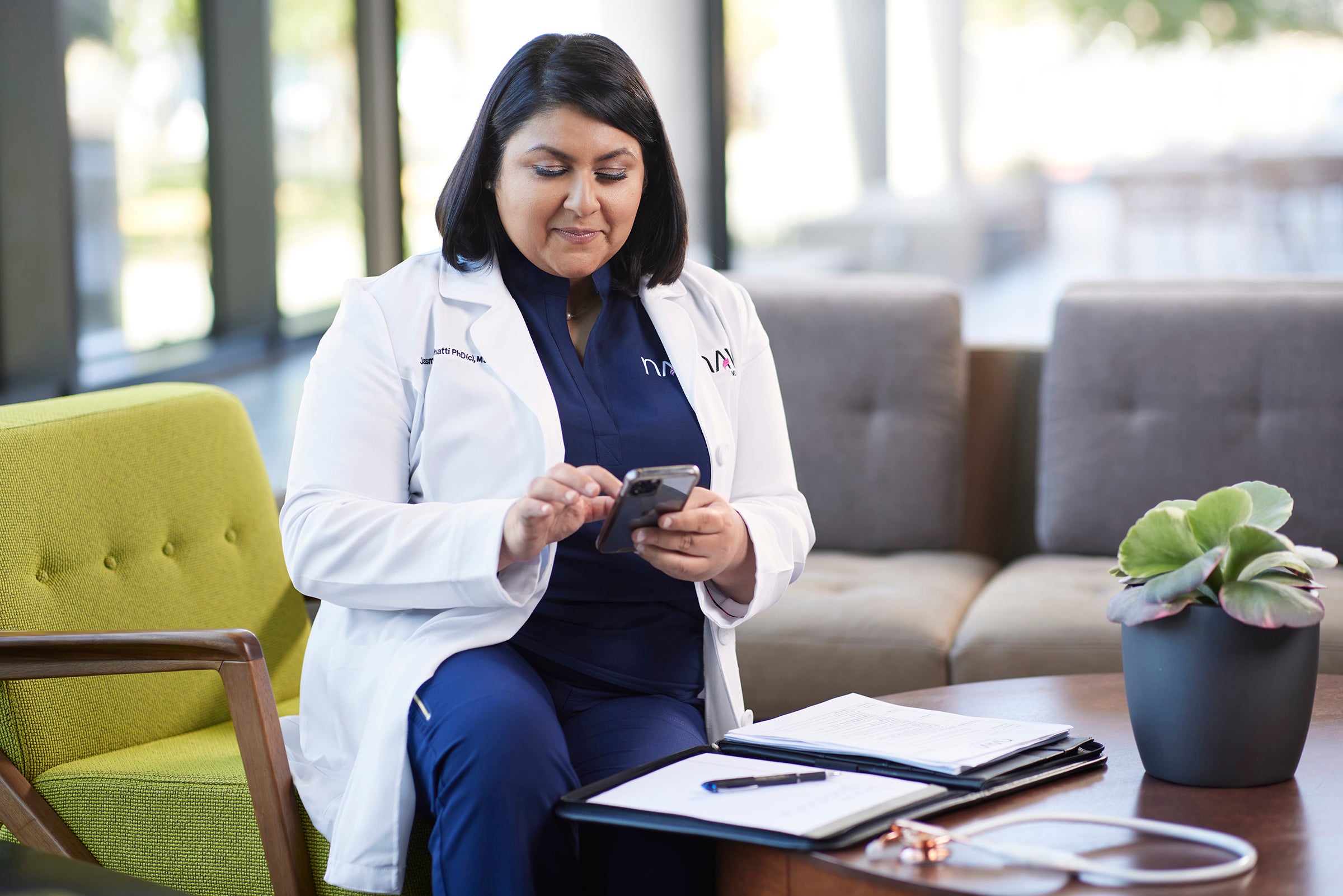Editor's note: This story originally appeared in the fall 2021 issue of ASU Thrive magazine.
Lucille and Thomas Julian welcomed a repair technician — masked — into their home last December. One week later, the company called to tell them that the technician had been diagnosed with COVID-19. The Goodyear, Arizona, couple initially tested negative for the virus, but within a few days, Thomas, who was 79 at the time, exhibited symptoms.
Lucille, then 74, managed to evade the virus’s wrath, but for Thomas, a cancer survivor, the virus was less kind.
“He kept getting worse,” Lucille recalls. “My brother suggested a private nurse.”
In an online search, Lucille found Navi Nurses, co-founded by Jasmine Bhatti, a registered nurse and PhD student in the Edson College of Nursing and Health Innovation; and registered nurse Ayan Said, ’14 BA psychology. The nurses see an opportunity to help improve patients’ health and create positive professional nursing experiences by closing a gap in health care.
From idea to startup
As a PhD student, Bhatti taught sections of ASU 101 for students in the Edson College of Nursing and Health Innovation, which introduced her to the Health Entrepreneurship Accelerator Lab (HEALab), which provides resources for innovators and entrepreneurs seeking to take health-related business ventures to market.
Primarily located on the Downtown Phoenix campus at 850 PBC (Phoenix Biomedical Campus) with additional programming on the West campus and online, HEALab is an initiative supported by the J. Orin Edson Entrepreneurship + Innovation Institute, the Edson College of Nursing and Health Innovation, the College of Health Solutions and the New College of Interdisciplinary Arts and Sciences. In their ASU 101 classes, Nursing and Health Innovation first-year students receive a semester-long small-group assignment to develop an innovative solution to a particular health problem. The HEALab provides innovation and ideation training, with some students receiving startup funding.
“That’s over 600 nursing students, health innovation students, community health students and integrated health students every fall,” says Rick Hall, senior director and clinical professor of health innovation in Edson College.
When Bhatti brought her students to the HEALab, the lectures sparked something in her. “I keep this book of things I want to change in health care,” Bhatti says. So, she asked Hall for his opinions. When he heard her ideas, he encouraged Bhatti to pursue Navi Nurses, which the founders liken to an Uber that families and individuals can reach out to for professional, on-demand nursing care.
“This is the one right here, the one you should go with,” Hall told her. He, too, saw the unmet need and the potential to scale it using technology.
A journey of entrepreneurship
Jasmine Bhatti hopes to make Navi Nurses a common name by scaling with an app and a bigger geographical reach.
“We meet people exactly where they’re at in their health care journey. We fill the gaps and provide care,” Bhatti says, allowing patients and families to make the best health care decisions. “We help take away caregiver burden and help people attain the best quality of life possible.”
The founders named the company after the Hindu word “anavi” — meaning the first ray of the sun, and also a peace-loving, kind person — both apt descriptions for nurses. It also helps connote “navigation,” for the many patients requiring help finding their way through their health journeys.
Bhatti discovered the ideal co-founder in Said at a Phoenix Startup Week event.
“We realized that we both had that drive and desire to improve health care,” Bhatti says. “We’ve taken an idea that started with me, but it’s our journey now together.”
In the early stages, the company brought in Shawn Harrell, ’84 MS in nursing, a retired health care administrator and executive who previously sat on the Arizona State Board of Nursing, to help them navigate the licensing process. Being able to work with someone with licensing expertise was valuable in getting the company going, Said points out.
As part of running Navi Nurses, Said and Bhatti work as nurses for their company and train nurses to work for them. Until earlier this year, they also maintained their full-time hospital nursing jobs.
“It’s a big, big step for us,” Bhatti says. “But we can’t make this happen unless we’re able to dedicate 100% of our time. We took our first (Navi) patient in February 2020, and then everything happened. We paused because we needed to care for our community. Since this past January, Navi Nurses has been able to blossom — and it’s exciting.”
In the first five months of 2021, the company hired 45 contract nurses to serve the Phoenix metro area.
The company also has been able to hire three nursing grads — Gianna LaPaglia ’19 BSN, Mea Valli Doherty ’19 BSN and Jasmine Cura ’20 BSN — whom Bhatti taught when they were juniors at ASU.
“It is really fulfilling to go from watching them learn as students, to being incredible nurses who make such a difference,” Bhatti says. “I get to watch them blossom and help them continue to grow.”
Filling a gap

Ayan Said believes everyone should have access to expert in-home nursing care.
Navi Nurses helps patients transition from the hospital to home, reducing the risk of hospital readmission, Bhatti says. They work with people who fly in for a procedure and then need a professional nurse after surgery. And for patients like the Julians, they provide care and serve as advocates to help people stay in their homes longer.
“The cost of assisted living runs about $100,000 per year,” Bhatti says. “People want to stay at home. We help them do it safely and under the watchful eye of an expert, compassionate nurse.”
With additional funding from competitions and investors, the company plans to build a custom app and broaden its geographical reach.
As Navi Nurses grows, they plan to expand their charity care program. Currently, they donate care to one person or family in need every month.
They feel grateful to ASU and its resources. In addition to their start at the HEALab, Bhatti and Said took advantage of Venture Devils, a program that supports founders and helps connect them to funding. In May of 2020, they competed in a Demo Day and won $10,000 to help build their venture.
“Building a business can feel daunting,” Said says, “but one of the biggest lessons we’ve learned is that it’s so important to surround yourself with the right people. Galvanizing others with a single powerful vision is how you truly make an impact. Everything else, you pick up along the way.”
Benefiting others
During their journey, the founders discovered that they can provide a positive working environment for nurses.
“Research shows that at least 25% of nurses work multiple jobs. And that can be hard if you’re working two hospital jobs because you’re going from one stressful environment to another stressful environment,” Bhatti says. “Our nurses tell us they can work a 12-hour shift (for Navi) and not feel exhausted afterward. We hope to keep people in the profession doing what they’ve always wanted to do.”
For the Julians, Navi Nurses proved invaluable.
“The day that Ayan came, my husband was very sick,” Lucille says. “I was so glad she was there that day because I could not have handled it myself.”
They were so impressed with Said that they hired her on an ongoing basis. And Said helps keep their daughter, who lives in California, in the loop.
The Julians’ experience, Bhatti and Said say, shouldn’t be isolated.
“We believe that every family, every person deserves a nurse, and that’s what we want to be — we want to be a household name,” Bhatti says, noting that building capital is an essential next step. “We can do this on our own, but it would take longer. We want to grow big and make an impact.”
Transforming lives
- Get support from the HEALab for your health innovation at entrepreneurship.asu.edu/entrepreneurship-innovation-healab.
- Contact Navi Nurses at navinurses.com/contact.
Story by Stephanie R. Conner, ‘01 BA journalism. Photos by Brandon Sullivan
Top photo: Startup Navi Nurses was co-founded by (left) Jasmine Bhatti, a registered nurse and PhD student in the Edson College of Nursing and Health Innovation; and registered nurse Ayan Said, ’14 BA psychology. The company provides on-demand professional nursing services.
More Health and medicine

ASU teams up with Maricopa County to address local life expectancy gap
Arizona State University’s College of Health Solutions is partnering with the Maricopa County Board of Supervisors to address a 14-year life expectancy gap between residents of north Scottsdale and…

ASU professor named Rural Health Fellow
If you live in a major city, chances are you don’t spend much time thinking about what happens in smaller towns and rural areas. But Aaron Guest, an assistant professor at Arizona State…

The rise of NoLo: Many young people opting to reduce alcohol consumption
This month, the U.S. surgeon general released a new advisory on the link between alcohol and cancer risk.The advisory includes a series of recommendations to increase awareness of the link, including…

